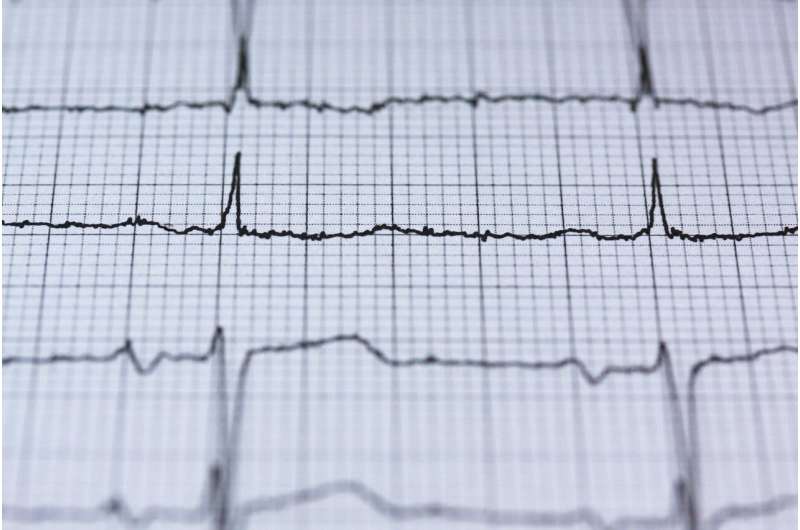This article has been reviewed according to Science X's editorial process and policies. Editors have highlighted the following attributes while ensuring the content's credibility:
fact-checked
peer-reviewed publication
trusted source
proofread
Stress and insomnia for women linked to irregular heart rhythms after menopause

After menopause, an estimated 1 in 4 women may develop irregular heart rhythms—known as atrial fibrillation—in their lifetime, with stressful life events and insomnia being major contributing factors, according to new research published today in Stroke.
Atrial fibrillation may lead to blood clots, stroke, heart failure or other cardiovascular complications. It primarily affects older adults, and more than 12 million people in the U.S. are expected to develop atrial fibrillation by 2030, according to the American Heart Association.
"In my general cardiology practice, I see many postmenopausal women with picture perfect physical health who struggle with poor sleep and negative psychological emotional feelings or experience, which we now know may put them at risk for developing atrial fibrillation," said lead study author Susan X. Zhao, M.D., a cardiologist at Santa Clara Valley Medical Center in San Jose, California. "I strongly believe that in addition to age, genetic and other heart-health related risk factors, psychosocial factors are the missing piece to the puzzle of the genesis of atrial fibrillation."
Researchers reviewed data from more than 83,000 questionnaires by women ages 50-79 from the Women's Health Initiative, a major U.S. study. Participants were asked a series of questions in key categories: stressful life events, their sense of optimism, social support and insomnia.
Questions about stressful life events addressed topics such as loss of a loved one; illness; divorce; financial pressure; and domestic, verbal, physical or sexual abuse. Questions about sleeping habits focused on if participants had trouble falling asleep, wake up several times during the night and overall sleep quality, for example. Questions about participants' outlook on life and social supports addressed having friends to talk with during and about difficult or stressful situations; a sense of optimism such as believing good things are on the horizon; and having help with daily chores.
During approximately a decade of follow-up, the study found:
- About 25% or 23,954 women developed atrial fibrillation.
- A two-cluster system (the stress cluster and the strain cluster).
- For each additional point on the insomnia scale, there is a 4% higher likelihood of developing atrial fibrillation. Similarly, for each additional point on the stressful life event scale, there is a 2% higher likelihood of having atrial fibrillation.
"The heart and brain connection has been long established in many conditions," Zhao said. "Atrial fibrillation is a disease of the electrical conduction system and is prone to hormonal changes stemming from stress and poor sleep. These common pathways likely underpin the association between stress and insomnia with atrial fibrillation."
Researchers noted that stressful life events, poor sleep and feelings, such as depression, anxiety or feeling overwhelmed by one's circumstances, are often interrelated. It's difficult to know whether these factors accumulate gradually over the years to increase the risk of atrial fibrillation as women age.
Chronic stress has not been consistently associated with atrial fibrillation, and the researchers note that a limitation of their study is that it relied on patient questionnaires utilized at the start of the study. Stressful life events, however, though significant and traumatic, may not be long lasting, Zhao notes. Further research is needed to confirm these associations and evaluate whether customized stress-relieving interventions may modify atrial fibrillation risk.
Study details and background:
- Participants were recruited between 1994 and 1998.
- The average age of the 83,736 women included in the study was about 64 years old. Approximately 88% of the group were women who self-identified as white; 7.2% identified as Black women; and 2.9% self-identified as Hispanic women.
- As women live longer, they may face higher risk and poorer outcomes associated with atrial fibrillation. While high blood pressure, obesity, Type 2 diabetes and heart failure are recognized risk factors, more research is needed about how the exposure to psychosocial stress and overall emotional well-being over time may affect the potential development of atrial fibrillation.
More information: Association Between Insomnia, Stress Events, and Other Psychosocial Factors and Incident Atrial Fibrillation in Postmenopausal Women: Insights From the Women's Health Initiative, Stroke (2023). DOI: 10.1161/JAHA.123.030030





















